 CNN, The New York Times, and several other news organizations were reportedly banned from the White House press briefing on Friday. Many veteran journalists are understandably outraged by the development because the move seemed to be in retaliation for stories that the Trump administration didn’t like.
CNN, The New York Times, and several other news organizations were reportedly banned from the White House press briefing on Friday. Many veteran journalists are understandably outraged by the development because the move seemed to be in retaliation for stories that the Trump administration didn’t like.
The controversial gaggle was held in White House Press Secretary Sean Spicer‘s office. “This is an unacceptable development by the Trump White House,” CNN said in a statement. On top of being unacceptable, the move by the White House may also be illegal and unconstitutional. It is one thing for the Trump campaign or even the DNC to ban certain journalists from rallies or press conferences. But, Trump is now the President, and as a government official, he answers to the taxpayers and the Constitution.
“It’s unconstitutional when President Trump has said he doesn’t like CNN and the New York Times and then excludes them from a press conference. It’s a content-based ban and the government generally cannot enact laws or restrictions that punish speech based or restrict public access based on content. Courts have held that a government press conference is a public forum generally open to the media, and any restrictions must be based on reasons other than content,” First Amendment attorney and LawNewz columnist Susan Seager said.
A White House spokesperson, in an attempt to defend the move, claimed that the White House “had the pool there so everyone would be represented and get an update from us today.” However, CNN reports this is not what happened at all. It was not a “pool situation” which would mean a representative from only one tv station, one radio outlet, one newspaper attended the meeting. Instead, during this incident, NBC, ABC, CBS and FOX News were all allowed in Spicer’s office — and only CNN (of the television networks) was kept out.
“This is not the same as when the government selects one television network camera to serve as a pool camera.. Here, the president has publicly criticized the New York Times and CNN. So it seems pretty clear this is punishment for the content published those news outlets, and President Trump and Sean Spicer cannot reasonably claim that this ban was content-neutral,” Seager continued.
It’s no secret that over the last few days, CNN has been aggressively reporting a story about how Trump’s Chief of Staff Reince Priebus pressured the FBI to release a statement to squash stories about the Trump/Russia ties. As a result, Trump has strongly criticized the network. Just today he called them “fake news” and the “Clinton News Network”
The courts have weighed in on this issue on many occasions before, and it doesn’t bode well for the Trump administration.
In Sherrill v. Knight (D.C. Circuit 1997), The Nation magazine sued after a journalist was denied a White House press pass. In that decision, the Circuit Court and lower court both said that the White House can’t just deny credentials based upon what the journalists say. “..[W]e agree with appellants that arbitrary or content-based criteria for press pass issuance are prohibited under the first amendment,” the D.C. court wrote in the decision.
In another interesting case from 1988, the Jefferson Parish Sheriff’s Office didn’t like a story by the Times-Picayune so as retaliation the deputies stopped notifying the newspaper’s reporters of press conferences, and also barred them from attending press conferences if they did find out about them. In Times-Picayune Publishing Corp. v. Lee, the court held that this move by the Sheriff’s office violated the First Amendment. “Discriminatory governmental action aimed at the communicative impact of expression is presumptively at odds with the First Amendment. Above all else, the First Amendment means that the government cannot restrict freedom of expression on the basis of its ideas, message or content,” the federal court found.
Courts have said that it is permitted for government officials to enforce other kinds of restrictions to journalists. For example, it would be okay for Trump to do a million exclusive interviews with Fox News, and never give one to ABC. However, when it comes to press conferences and briefings that are supposed to be open to the media, the rules are different.
CNN and The New York Times have not indicated that they plan to take legal action, but as you can see, if they did they very well may have a winning case.
Have a tip we should know? [email protected]